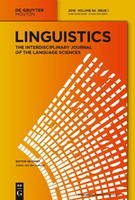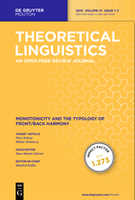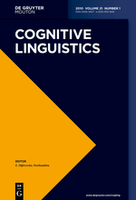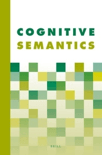
LINGUISTICS
Scope & Guideline
Connecting Ideas in the World of Linguistics
Introduction
Aims and Scopes
- Formal Linguistic Theories:
The journal emphasizes the exploration of formal theories of syntax, semantics, and their implications for understanding human language structure. - Cognitive Linguistics:
Research often delves into the cognitive processes underpinning language use, addressing how language interacts with human cognition. - Language Evolution:
A significant focus is on the evolutionary aspects of language, investigating how language may have developed in humans and its implications for understanding human uniqueness. - Biolinguistics:
The journal promotes the interdisciplinary study of biology and linguistics, particularly how biological factors influence language processing and structure. - Comparative Studies of Language Models:
Recent articles also critique and compare human linguistic capabilities with those of artificial language models, shedding light on the nature of human cognition.
Trending and Emerging
- Integration of Cognitive Science and Linguistics:
There is an increasing trend towards integrating cognitive science with linguistic theories, exploring how cognitive processes shape language structure and use. - Artificial Intelligence and Language Processing:
The examination of large language models and their comparison to human linguistic abilities is a burgeoning area, highlighting the intersection of technology and linguistics. - Evolutionary Linguistics:
Research focusing on the evolutionary aspects of language development is gaining momentum, addressing how language may have evolved and its implications for understanding human cognition. - Formalization of Linguistic Theories:
There is a growing emphasis on formalizing linguistic concepts such as Merge and Agree, suggesting a trend towards more rigorous theoretical frameworks in syntax. - Interdisciplinary Approaches:
The journal encourages interdisciplinary studies, linking linguistics with biology, psychology, and artificial intelligence, showcasing the relevance and applications of linguistic research.
Declining or Waning
- Traditional Syntax Theory:
There has been a noticeable decline in papers solely focused on traditional syntactic frameworks without integrating cognitive or evolutionary perspectives. - Historical Linguistics:
Research relating to the historical development of languages appears to be waning, as the journal pivots toward contemporary issues in language processing and cognition. - Purely Descriptive Linguistics:
The trend towards less emphasis on purely descriptive studies, which do not engage with theoretical or cognitive implications, suggests a gradual phasing out of such approaches.
Similar Journals

Catalan Journal of Linguistics
Pioneering Research in Catalan Language Dynamics.Catalan Journal of Linguistics is a distinguished academic publication dedicated to the dynamic field of linguistics and language studies. Published by the Universitat Autònoma de Barcelona, this open-access journal has been disseminating impactful research since 2002, making significant contributions to the understanding of linguistic theory, language acquisition, and sociolinguistics, particularly within the Catalan language context. With a robust engagement in the scholarly community, it proudly holds a Q2 ranking in Linguistics and Language as of 2023, reflecting its commitment to high standards of research and innovation. The journal is accessible to a global audience, promoting the free exchange of knowledge beyond geographical boundaries, and serves as an essential platform for researchers, professionals, and students aiming to stay at the forefront of linguistic inquiry. With its rich archive of articles, the Catalan Journal of Linguistics stands as a vital resource for anyone keen to explore contemporary linguistic issues and advancements.

THEORETICAL LINGUISTICS
Exploring the Depths of Language TheoryTHEORETICAL LINGUISTICS, published by Walter de Gruyter GmbH, is a prominent journal dedicated to exploring the intricate dimensions of linguistics, positioning itself as an essential resource for scholars and practitioners in the field. Established in 1974, this Germany-based journal has undergone significant evolution, contributing to the theoretical and empirical understanding of language with a focus on diverse linguistic phenomena. As evidenced by its Q2 ranking in the Linguistics and Language category for 2023, THEORETICAL LINGUISTICS engages with innovative theoretical discussions and methodologies, making it a vital platform for researchers navigating the complexities of language structure and usage. Though not an open-access journal, it ensures accessibility through robust distribution networks, fostering collaboration and knowledge-sharing within the academic community. With a consistent output from 1990 to 2024, this journal stands at the intersection of linguistics and language studies, appealing to a wide audience of researchers, professionals, and students alike.

Biolinguistics
Fostering Interdisciplinary Research in BiolinguisticsBiolinguistics, published by the University of Cyprus, Department of English Studies, is a distinguished Open Access journal that has been at the forefront of exploring the intricate relationships between biology and language since its inception in 2007. With an ISSN of 1450-3417 and an impressive presence in both Experimental and Cognitive Psychology and Linguistics, this journal ranks in the Q4 and Q3 Quartiles respectively, indicating its significant contribution to these fields. Situated in Nicosia, Cyprus, the journal aims to bridge interdisciplinary gaps, drawing insights from cognitive science, linguistics, and biological studies, making it essential reading for researchers, professionals, and students. With current Scopus rankings placing it in the 77th percentile for Language and Linguistics and a 20th percentile in Experimental and Cognitive Psychology, Biolinguistics continues to make an impactful mark on the academic community. As you delve into its enriching content, you can expect rigorous peer-reviewed articles that pave the way for innovative research and discourse within the realm of biolinguistics.

COGNITIVE LINGUISTICS
Unraveling the Tapestry of Thought and Language.COGNITIVE LINGUISTICS, published by De Gruyter Mouton, is a premier academic journal dedicated to advancing the field of cognitive linguistics and its interconnections with psychology and language studies. With an impressive impact factor and a ranking in the Q1 category for Linguistics and Language, as well as Q2 in Developmental and Educational Psychology according to 2023 metrics, this journal demonstrates its significance in fostering scholarly discourse and innovation. The journal's rigorous peer-reviewed approach ensures that only high-quality research is shared with its audience, including professionals, researchers, and students keen on exploring the cognitive aspects of language. Since its inception in 1990, COGNITIVE LINGUISTICS has been a vital platform for disseminating cutting-edge studies, making it an invaluable resource for anyone interested in the intersections of cognitive science and linguistics.

Jezikoslovlje
Fostering Dialogue in Linguistic ResearchJezikoslovlje, published by the Josip Juraj Strossmayer University, Faculty of Philosophy in Croatia, is an essential publication in the field of Linguistics and Language Studies. Launched in 2008 and extending its contributions to the academic community through 2024, this journal addresses a spectrum of linguistic research, facilitating scholarly dialogue around both theoretical and applied aspects of language. With a current Scopus ranking placing it in the 54th percentile in the Arts and Humanities and the 50th percentile in Social Sciences, Jezikoslovlje serves as a vital resource for researchers and students looking to engage with contemporary linguistic issues. Although it operates under a traditional access model, its indexed presence and rigorous peer-review process ensure that published works maintain a high scholarly standard, inviting contributions that advance understanding in this dynamic discipline. The journal's commitment to fostering knowledge in linguistics makes it a significant platform for academics in Croatia and beyond.

NEUPHILOLOGISCHE MITTEILUNGEN
Exploring the Depths of Language and LinguisticsNEUPHILOLOGISCHE MITTEILUNGEN, published by the esteemed Modern Language Society, stands as a significant contribution to the domain of Language and Linguistics. With a history dating back to 1971, this journal has consistently provided an academic platform for researchers and scholars, navigating through the intricacies of philology and linguistic studies. Although it is indexed in Scopus with rankings reflecting its position in the Arts and Humanities and Social Sciences categories, it currently does not offer Open Access, which may require interested parties to seek institutional access for its wealth of content. The journal has experienced periods of coverage discontinuation in recent years, yet it remains a valued source for advancing the understanding of language theories and linguistic practices. Its location in Helsinki, Finland, offers a unique European perspective on global linguistic issues. The journal is ideal for those looking to engage with evolving linguistic trends and contribute to contemporary discussions in the field.

Functions of Language
Charting New Territories in Language and CommunicationFunctions of Language, published by John Benjamins Publishing Co, serves as a vital platform for scholars and practitioners in the fields of linguistics and language studies. With its ISSN 0929-998X and E-ISSN 1569-9765, this esteemed journal, based in the Netherlands, has solidified its reputation through a focused dedication to exploring the multifaceted roles that language plays across various contexts. Ranked in the top percentile of leading journals in Linguistics and Language (Q2 category, 2023) and holding impressive Scopus ranks within both the Arts and Humanities and Social Sciences sectors, the journal emphasizes research that interlinks theoretical insights with practical implications. Functions of Language aims to advance our understanding of linguistic structures and their applications, making it an essential resource for researchers, professionals, and students alike who are eager to contribute to the evolving discourse in language studies. With content converging from 1994 to 2024, the journal reflects ongoing scholarly engagement and innovation in the field.

Lege Artis-Language Yesterday Today Tomorrow
Unveiling the Dynamics of Linguistic ChangeLege Artis: Language Yesterday Today Tomorrow is a pivotal open access journal dedicated to the dynamic and multifaceted study of language, linguistics, and communication in contemporary society. Published by the esteemed University of SS Cyril & Methodius in Trnava, Slovakia, this journal serves as a vital platform for scholars and practitioners to explore the evolution of language and its impact on culture and society. With an ISSN of 2453-8035, Lege Artis has embraced open access since 2016, ensuring that its valuable research findings are freely available to all, thus promoting wider dissemination and engagement within the academic community. The journal invites contributions that enrich the understanding of linguistic theory, historical linguistics, sociolinguistics, and applied linguistics, making it an essential resource for researchers, educators, and students alike. By fostering an interdisciplinary approach, Lege Artis aims to contribute significantly to our understanding of language as a living entity, continuously evolving and adapting to societal changes.

Russian Journal of Linguistics
Pioneering Insights in the Study of LanguageWelcome to the Russian Journal of Linguistics, a prestigious journal published by Peoples Friendship University of Russia that has made significant strides in the realm of linguistic studies since its inception. With an Open Access policy established in 2019, this journal provides unparalleled opportunities for researchers, professionals, and students to share and disseminate groundbreaking linguistic research. The journal is currently ranked in the Q1 category for Linguistics and Language and boasts impressive Scopus rankings, placing 129th out of 1088 in the Arts and Humanities, and 148th out of 1167 in the Social Sciences. Focusing on a diverse range of linguistics topics, the journal aims to facilitate cross-disciplinary dialogue and foster advancements in the study of language. Located in Moscow, Russia, it champions the vibrant linguistic community by consistently publishing high-quality research that contributes to the global understanding of language dynamics. We invite you to explore the wealth of knowledge and insight the Russian Journal of Linguistics has to offer.

Cognitive Semantics
Bridging Linguistics and Cognitive ScienceCognitive Semantics, published by BRILL, is a leading academic journal dedicated to the intricate study of cognitive processes underlying language use and semantic meaning. With its ISSN 2352-6408 and E-ISSN 2352-6416, this journal contributes significantly to the fields of linguistics and language studies, reflecting its importance in contemporary research on cognitive linguistics. Over its publication span from 2015 to 2024, it has established a niche as a Q3 ranked journal in the Linguistics and Language category for 2023, showcasing its relevance and growing influence in the academic community. Although currently not open access, the journal aims to provide a robust platform for exchanging ideas, theories, and methodologies related to cognitive semantics, fostering interdisciplinary dialogue among researchers, professionals, and students. Readers can expect to uncover valuable insights into the cognitive mechanisms that shape our understanding of language, making this journal an essential resource for anyone involved in linguistic research.